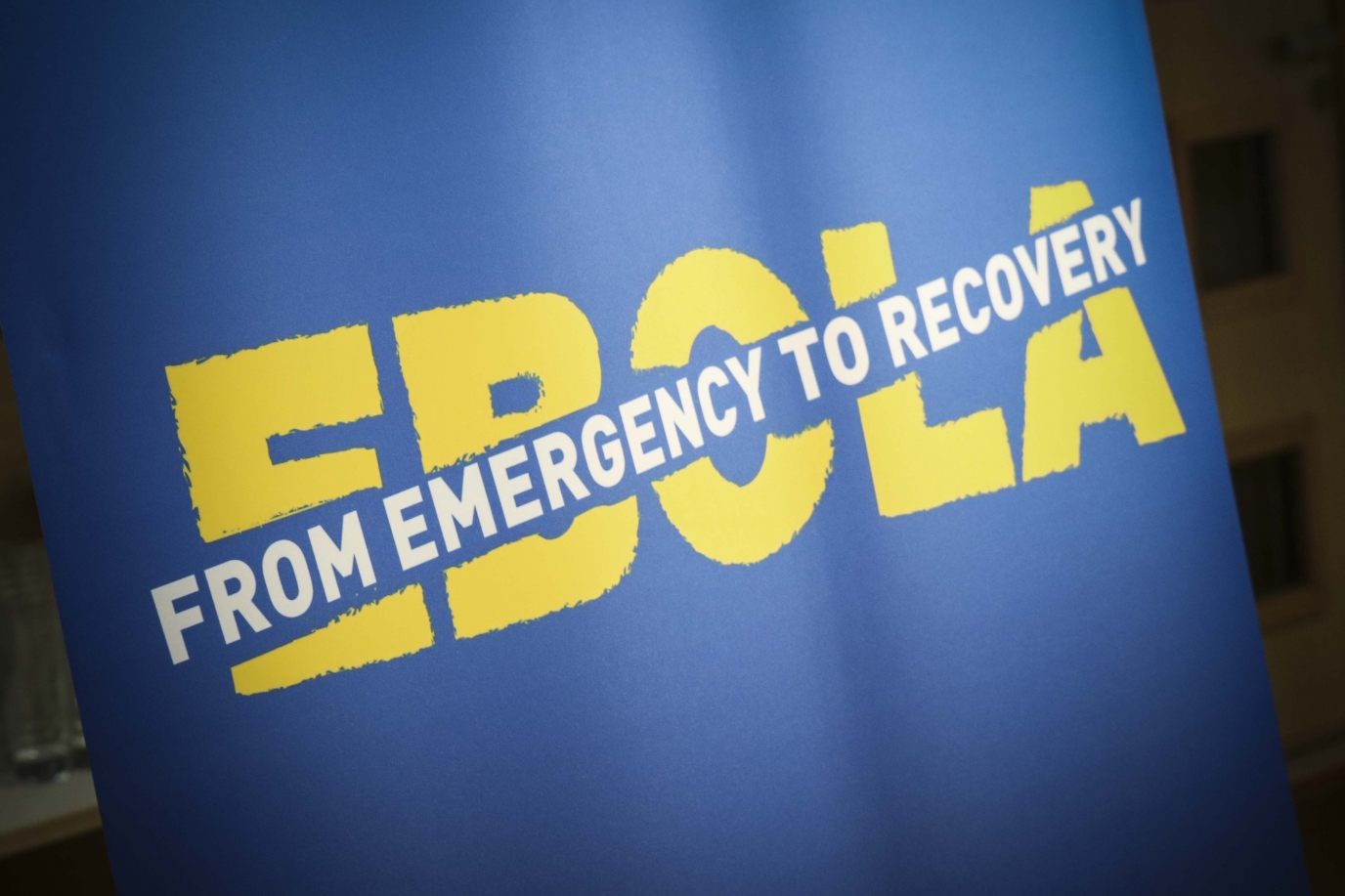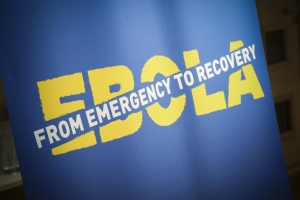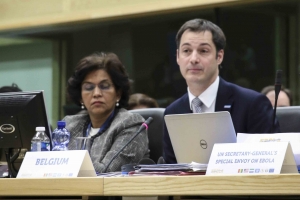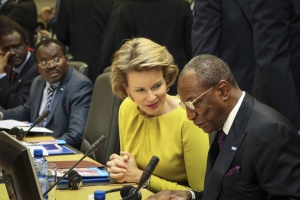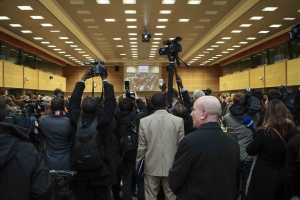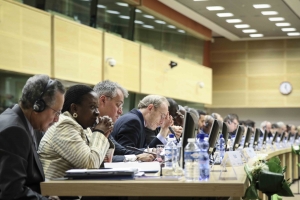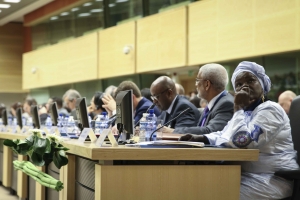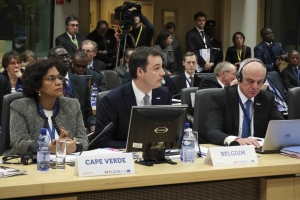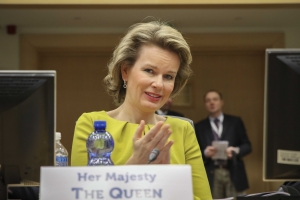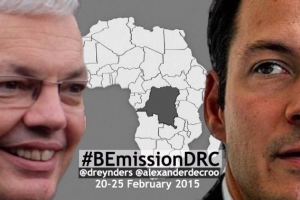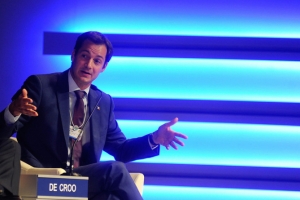Conference : 'Ebola: from Emergency to Recovery' (Brussels) - March 3, 2015
Your Majesty,
Excellencies,
Ladies and gentlemen,
First of all, I would like to convey a warm word of welcome to Her Majesty Queen Mathilde. Majesty, your interest to the broader field of development cooperation and humanitarian aid is commonly known. Right from the beginning of the current ebola crisis you devoted your high attention to it and provided us all with your support. Your presence here today is yet again exemplary of your personal attention to this crisis.
I would also like to apologize Prime Minister Charles Michel for not being able to make it today. As you probably know, in a previous life the Prime Minister has served as Minister for Development Cooperation and he also has a special interest for the fight against ebola. He has requested me to speak on his behalf.
Lastly, I would like to welcome the co-Chairs, the Presidents of Liberia, Sierra Leone and Guinea, as well as, among other distinguished guests, the President of Congo-Brazzaville, the Prime Minister of Togo and High Representative Mogherini. And I would like to thank the EU for organizing this important conference in the premises of the Belgian foreign ministry.
Your Majesty,
Ladies and Gentlemen,
It is now almost 40 years ago since the so-called Ebola Virus Disease (EVD) was discovered. We speak of 1976 and it was a young and devoted Belgian doctor, Peter Piot, who identified the virus in the village of Yambuku, in today’s Democratic Republic of Congo.
Four decades have passed since then and the ebola virus has struck communities at various occasions, each time in a harsh and cruel way. These epidemics somehow always ended after a few months of time and did not seem to result in a true systemic crisis. Or at least, this is how the international community had perceived it up until last year.
2014 became the year of the global wake-up call. Most probably it was a two-year-old boy in the town of Guéckédou, in Guinea, who was the first victim of the current ebola epidemic. He already died in 2013, on December 6th to be more precisely.
Things went very fast then and it was the organization Médecins Sans Frontières who first rung the alarm bell. Being active in the field and on ebola since many years, they had never seen an outbreak of the virus with such dimensions. In August last year, the World Health Organization (WHO) declared it as a “Public Health Emergency of International Concern”. By mid-February 2015, 9.365 deaths were counted and 23.218 cases were registered in West-Africa. By the turn of the year, the efforts of the so many courageous local and international health workers seemed to result in success. But we again start to receive alarming figures; in the week up to February 22nd, the WHO reported 99 new confirmed cases.
Ladies and gentlemen,
Right from its beginning, the ebola outbreak constituted a first and foremost priority for the Belgian government. Up until now my own ministry, through the budgets of humanitarian emergency aid, has allocated a total amount of more than 39 million € for the fight against ebola. The Belgian intergovernmental emergency and response team B-FAST has set up the mobile B-LIFE field labo in Nzérékoré (Guinea) where blood samples are being tested and the results are being sent for further analysis to the WHO. The B-FAST team in the meantime has returned to Belgium, but the labo is still there, being funded by my administration and being operated by the French ngo Alima.
Also Belgian semi or non-governmental actors contributed greatly to the fight against ebola. Researchers of an international consortium led by the Institute for Tropical Medicine in Antwerp are currently conducting research on a possible cure, at the request of the EU. Brussels Airlines was the only European carrier that maintained its flights on Sierra Leone, Liberia and Guinea; they truly saved these countries from isolation.
Ladies and gentlemen,
We have all witnessed to what extent the current outbreak of the ebola virus was an enormous challenge at the local, national and international level. It is key to address these three levels. Locally, to adapt attitudes and take precautions to protect the community and to react in case of a contamination. Nationally, the decentralized health systems must be upgraded to cope with such challenges. And internationally, a fast and efficient response must be guaranteed. But what is especially important is to create a level of trust between those three levels.
Systemic crises require systemic responses. National health systems need to be inclusive so that affected people can rely on their governments for healthcare and protection. These governments need to rely on the support of the civil society through their national associations and ngo’s and they need to rely on the international solidarity through bilateral aid, the EU and the UN, and international ngo’s and organizations. We also need a simplification of the existing tools that are used by the international community. This was also a lesson we have all learned the past few months.
So far, our focus has been on countering the epidemic and its effects. But this is only the first part of the story. The countries affected by ebola are now confronted with the colossal task of rebuilding almost everything: their health systems, their education systems, their economies. They cannot do this alone. Belgium is therefore examining whether at least one of these countries can be included in the list of 15 future partner countries of the Belgian development cooperation, which would enable the delivery of structural aid by Belgium.
Ladies and gentlemen,
I do hope that this important meeting will help us fostering an inclusive and more structural approach. It should be one that is really supportive to the countries in need.
Thank you.

